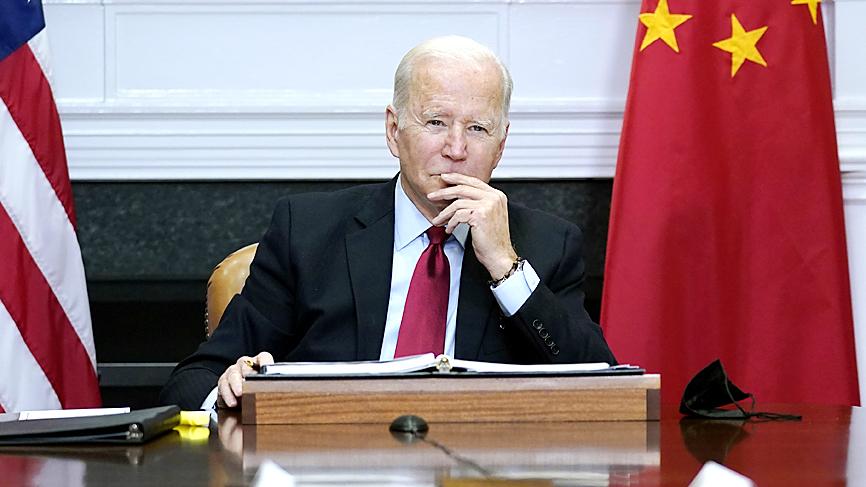The US on Thursday unleashed a volley of actions to censure China’s treatment of Uighurs, with lawmakers voting to curb trade and new sanctions slapped on the world’s top consumer drone maker.
The US Senate unanimously voted to make the US the first country to ban virtually all imports from China’s Xinjiang region over concerns of the prevalence of forced labor.
“We know it’s happening at an alarming, horrific rate with the genocide that we now witness being carried out,” said US Senator Marco Rubio, a driver behind the act, which already passed the House of Representatives and which the White House says US President Joe Biden will sign.

Photo: AP
After prolonged negotiations to secure its passage, Rubio lifted objections and the Senate confirmed veteran diplomat Nicholas Burns as ambassador to China.
Burns, a widely respected former ambassador to Greece and NATO, and a professor at Harvard, has called the treatment of Uighurs “genocide,” and described China as an “aggressor” in its relationship with Taiwan, Japan, the Philippines and Vietnam.
“Our responsibility is to make Taiwan a tough nut to crack,” Burns said, while rejecting a suggestion that the US ditch its longstanding policy of “strategic ambiguity,” which does not say whether it would intervene in an invasion of Taiwan.
Some US businesses had voiced unease about the Uyghur Forced Labor Prevention Act, which bans the import of all goods from the region unless companies offer verifiable proof that production did not involve slavery.
Xinjiang is a major source of cotton, with an estimated 20 percent of the garments imported each year into the US including some material from the region.
Rights experts, witnesses and the US government say that more than 1 million Uighurs and other Muslims are incarcerated in camps.
The Biden administration also fired off a round of sanctions over surveillance in Xinjiang, where rights groups say China has been honing new technologies to keep tabs on Uighurs.
Companies hit by US Department of the Treasury sanctions include SZ DJI Technology, by far the world’s largest producer of consumer drones of the type used in filmmaking and aerial photography, with more than 70 percent of the global market.
The US had already restricted trade exports to the company, but the new sanctions would criminalize any US investment in it.
The US Department of Commerce also restricted sensitive exports to the Chinese Academy of Military Medical Sciences and 11 of its research institutes over biotechnology work, including “purported brain-control weaponry,” a notice said.
Additional reporting by Bloomberg

ACTION PLAN: Taiwan would expand procurement from the US and encourage more companies to invest in the US to deepen bilateral cooperation, Lai said The government would not impose reciprocal tariffs in retaliation against US levies, President William Lai (賴清德) said yesterday, as he announced five strategies to address the issue, including pledging to increase Taiwanese companies’ investments in the US. Lai has in the past few days met with administrative and national security officials, as well as representatives from various industries, to explore countermeasures after US President Donald Trump on Wednesday last week announced a 32 percent duty on Taiwanese imports. In a video released yesterday evening, Lai said that Taiwan would not retaliate against the US with higher tariffs and Taiwanese companies’ commitments to

Intelligence agents have recorded 510,000 instances of “controversial information” being spread online by the Chinese Communist Party (CCP) so far this year, the National Security Bureau (NSB) said in a report yesterday, as it warned of artificial intelligence (AI) being employed to generate destabilizing misinformation. The bureau submitted a written report to the Legislative Yuan in preparation for National Security Bureau Director-General Tsai Ming-yen’s (蔡明彥) appearance before the Foreign Affairs and National Defense Committee today. The CCP has been using cognitive warfare to divide Taiwanese society by commenting on controversial issues such as Taiwan Semiconductor Manufacturing Co’s (TSMC, 台積電) investments in the

HELPING HAND: The steering committee of the National Stabilization Fund is expected to hold a meeting to discuss how and when to utilize the fund to help buffer the sell-off The TAIEX plunged 2,065.87 points, or 9.7 percent, to close at 19,232.35 yesterday, the highest single-day percentage loss on record, as investors braced for US President Donald Trump’s tariffs after an extended holiday weekend. Amid the pessimistic atmosphere, 945 listed companies led by large-cap stocks — including Taiwan Semiconductor Manufacturing Co (TSMC, 台積電), Hon Hai Precision Industry Co (鴻海精密) and Largan Precision Co (大立光) — fell by the daily maximum of 10 percent at the close, Taiwan Stock Exchange data showed. The number of listed companies ending limit-down set a new record, the exchange said. The TAIEX plunged by daily maxiumu in just

‘COMPREHENSIVE PLAN’: Lin Chia-lung said that the government was ready to talk about a variety of issues, including investment in and purchases from the US The National Stabilization Fund (NSF) yesterday announced that it would step in to staunch stock market losses for the ninth time in the nation’s history. An NSF board meeting, originally scheduled for Monday next week, was moved to yesterday after stocks plummeted in the wake of US President Donald Trump’s announcement of 32 percent tariffs on Taiwan on Wednesday last week. Board members voted to support the stock market with the NT$500 billion (US$15.15 billion) fund, with injections of funds to begin as soon as today. The NSF in 2000 injected NT$120 billion to stabilize stocks, the most ever. The lowest amount it